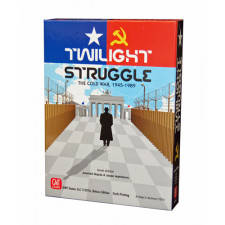Twilight Struggle Review
on Mar 3, 2016

Drew:
NO: Twilight Struggle represents one of the unlikeliest success stories in board gaming. It’s basically an area-control Eurogame with deep roots in wargame design, especially card-driven wargames. In other words it draws equally from El Grande and We the People, two games that seemingly have nothing to do with each other. It could have been a mess, but after over a decade it has become one of the most important games in the hobby, even enjoying a reign atop the Board Game Geek rankings as the number one game. But that success doesn’t surprise me a bit. Twilight Struggle is loaded with tension and thematic detail, with layer upon layer of strategy. It requires some effort from the player, but it’s absolutely worth the time it takes. Drew, what’s been your experience with Twilight Struggle?
DG: Logistically, Twilight Struggle is a frustrating title. It requires setting aside a multi-hour game session for just two players. And it isn’t the kind of game you can pick up and play and enjoy. To play well - even just to avoid getting your teeth kicked in - you need to have familiarity with the cards. In one game, my opponent put a lot of influence in France to start the game with neither of us knowing that was a bad move. Then, I drew and played the card that eliminates U.S. influence in France. Annoyance and anger was the result. Frankly, the barrier to entry for a new player (or two new players learning together) is so high that I’m surprised it’s so well regarded.
NO: You aren’t wrong about the learning curve. Twilight Struggle is one of those games where my first game was so rocky I’m proud of myself for making it through. For me it was not so much the need to know the cards (though you really do before the game can pay off), but the complexity. Compared to most of its wargame brethren, Twilight Struggle is pretty basic. But for those coming from a Eurogame background, it can be boggling to look at a hand of cards representing a series of historical events, knowing that there are about three ways each card can be used and that the ordering is vital.
But I don’t think that’s it’s a liability at all that the game asks something from the players. Do you need to know the cards to get anything out of the game? Absolutely. But the fact that it requires a certain level of commitment is something that makes the game appealing. Besides, any game that recreates the polarized tension of the Cold War, all forty-five years of it, should be at least a little demanding of the players. Even after many games I’m still discovering nuances I had never noticed. Drew, were you ever able to power through that bad first game and see some of the payoff at the other side?
DG: Oh sure. I’ve played it several times. But it asks not only that you become familiar with the system (which isn’t necessarily bad), and punishes you if you don’t, but it also asks that you set aside a relatively large amount of time for a two player experience. That requires a dedicated opponent who is also willing to spend the time to learn the game, and then commit to the lengthy two player affair. That kind of opponent can be hard to come by unless you happen to live with them.
And I certainly agree that it has substantial depth. It’s not the kind of game you can play once or twice and have completely figured out. But it isn’t the only complex, lengthy two player game that rewards familiarity. Just look at War of the Ring or Earth Reborn, even Chess or Go. Other than the theme (which I admit, is pretty neat), I’m really not sure what Twilight Struggle brings me that I can’t already get out of another logistically similar title. What brings you back to Twilight Struggle over these other options?
NO: That’s an excellent question, because you make a great point. There are a lot of long-ish two player games out there, and a lot of them are generally regarded as classics. Twilight Struggle stands out to me in a couple ways. As I already said, I’m fascinated by it from a design perspective. I remain impressed by the way it combined two disparate genres so well. But there’s also a terrific sense of tension in this game that I don’t find in other similar games. The game is normally supposed to go for ten turns, but usually it ends earlier through some other means. There’s the victory point track, which is more of a tug-of-war between the players and can trigger an auto-win in either direction. The players can also trigger nuclear war, which loses them the game automatically. There’s a third auto-win condition, controlling Europe when it scores, but that’s a little rarer in my experience. The point is that every game of Twilight Struggle feels like a bomb that’s about to explode at any minute. It doubles down on this too, by making scoring an unpredictable event, and by relying on die rolls to resolve key events in the game. It’s an incredibly tense game where strategic planning is vital, but might not pan out for you.
DG: Now that you mention it, I do dislike the die rolling. Maybe this is just my bias (I do love the dice-less euros), but I find the die rolling jarring. A lot of the game is very deterministic. If I play a card, I know what it is going to do, or I know how much influence I can place on the board. But at a few strange intervals, it injects uncertainty in some really weird ways. Like the space race. It’s not the most major aspect of the game, but losing an action on a botched roll doesn’t ever feel good. And it can be especially grating if your opponent is making his rolls and you aren’t. Then they get the benefit and you are stuck behind. Even though it isn’t the most important part of Twilight Struggle, it feels like a disconnect from the experience the rest of the game provides.
Speaking of bombs, though, I really like the way it handles the DEFCON. It definitely provides incentives towards brinksmanship - especially if you want to make it more difficult for the opponent to really shake up particular areas. But if you push the line too far, you lose.
NO: It’s definitely a game about brinkmanship, where it’s vital to take some big risks to push forward. Those risks do tend to revolve around die rolls, and the overall effect is a pretty swingy game. For me it translates into some terrific drama, but those who don’t like pivotal moments that depend on a die roll will be frustrated for sure. I do think all of those die rolls are perfectly appropriate given the setting. The space race involved a lot of failure and long-shot successes, so even though that particular mechanic is so abstracted, it still fits.
Actually, the best thing about Twilight Struggle is how well it taps into the emotions generated by the Cold War. The whole game is spent trying to get into your opponent’s mind. Why are they focusing on that region? Is it because they have big plans there? Better pump some influence there to thwart the plans that might not actually exist. That paranoia dovetails with the afore-mentioned brinkmanship to create palpable tension. While the strategy is involved and nuanced, this is what keeps me coming back to Twilight Struggle.
DG: But that, for me, is definitely a negative. You have this great atmosphere; a feeling of paranoia, suspicion, and brinksmanship. And when it comes time to resolve plans set in motion over several turns … a die roll. It seems so anticlimactic to end all of the strategic maneuvers with Yahtzee. (OK, not completely fair, I know. But it gets the point across.) I think Twilight Struggle has some amazing positives to its play. But the negatives mar the experience and typically send me reaching for another title on my shelf.
NO: Twilight Struggle definitely requires the players to accept some sharp swings in luck, or it’ll drive you crazy. For me those swings help create a narrative that keeps me coming back over and over again, and the multi-faceted strategy gives me something to think about every time, even after several games.

 Customer Support
Customer Support  Subscribe
Subscribe 




 Account
Account  Wishlist
Wishlist 

